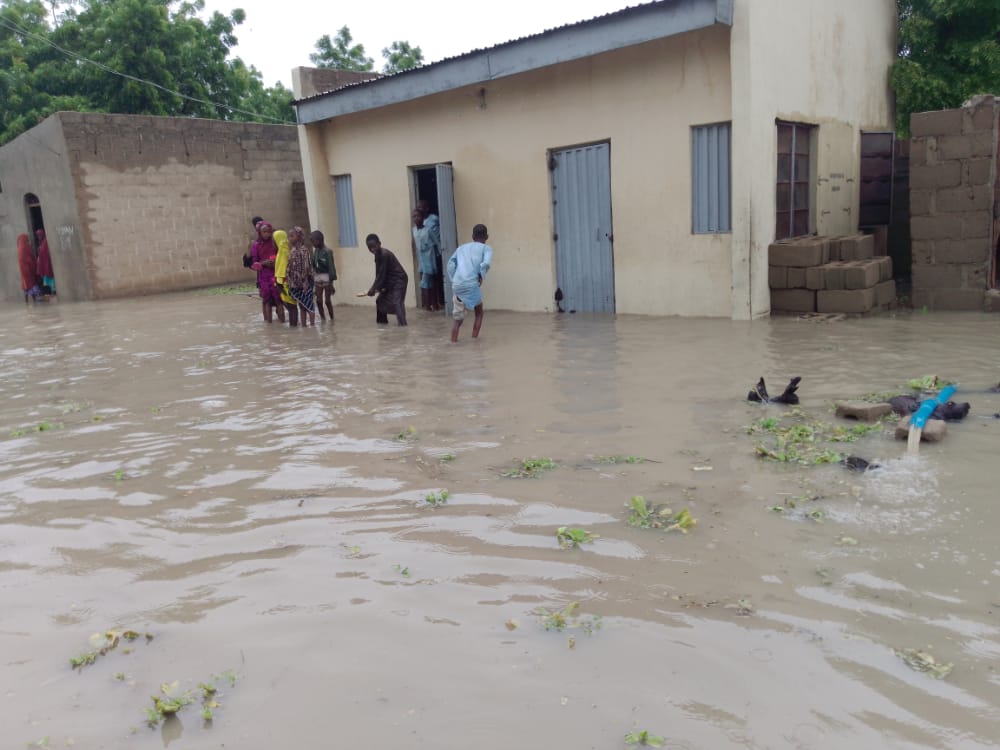What we’re watching: Weekly disaster update, August 15

We know all too well that disaster can strike at any time, in any place in the world. Some disasters make headlines; others do not. Here at the Center for Disaster Philanthropy, we keep an eye on the status of disasters worldwide and compile a list of the ones we’re tracking weekly, along with relevant disaster-related media coverage.
Here’s what we’re watching for the week of Aug. 15, 2022.
New or Emerging Disasters
Water Issues – Detroit, Michigan: More than 130,000 people remain on a boil water advisory in Greater Detroit. Nearly 1 million people in 23 communities were initially affected by a leak in a transmission line. Testing has reduced the number of communities to seven, but repairs could take two to four weeks.
Flooding – Pakistan: Severe monsoon rains have produced devastating flooding in July and early August. The flooding has affected more than 1 million people across the country, including 580 people killed and 939 injured. Pakistan received more than 60% of its total monsoon rainfall in just three weeks since the start of the season in July.
The southern province of Balochistan was particularly affected by the flooding, with more than 7,000 people displaced and tens of thousands of livestock killed, a key livelihood source. The government of Pakistan identified food security, agriculture and livestock; health; water, sanitation and hygiene; and shelter as priority needs.
Pakistan’s meteorological department has warned of a new round of monsoon rains, which could hamper relief efforts and add to the already significant devastation. Despite contributing less than 1% of global emissions, Pakistan is among the countries most vulnerable to climate change, according to the Climate Change Risk Index 2021.
Flooding – Afghanistan: According to the Taliban’s state-run news agency, heavy rains resulted in flash flooding in northern Parwan province on Aug. 14. At least 31 people were killed, including children, and at least 100 people remained missing. Thousands of acres of agricultural land, livestock and roads were affected. An official said more than 100 homes were partially or completely destroyed. Local weather officials forecast more rains in the coming days across the country. This latest round of flash flooding follows extensive flooding across several provinces in July. Afghanistan’s ongoing complex humanitarian emergency compounds the impacts of the recent flooding events.
Flooding – Nigeria: According to the country’s State Emergency Management Agency (SEMA) for Jigawa State, at least 50 people have died, and many are displaced following torrential rains that resulted in flooding in the northern state. At least 237 homes have been damaged, and 11 temporary camps have been established for displaced people. Since the beginning of the rainy season, more than 43,000 people have been affected by flooding in northern Nigeria. More than 60% of affected households have not received food assistance after weeks of displacement from the previous flooding events.
Previous/Ongoing Disasters
Flooding – Kentucky: Rainfall estimates show that 14 to 16 inches of rain fell in eastern Kentucky during five days, beginning on July 27, resulting in record flooding, extensive damage and loss of life. On Aug. 11, Kentucky Governor Andy Beshear announced the flooding death toll reached 39. Some Kentuckians who suffered property damages were not in a FEMA-designated flood zone, so they never thought they would need flood insurance. Only around 1% of properties in the hardest-hit counties have federal flood insurance, meaning many people may struggle to find funds to rebuild.
For more, see our 2022 Central Appalachia Floods disaster profile. On Aug. 4, we hosted a webinar on the eastern Kentucky flooding and a recording is available on our website.
Wildfire – California: The McKinney Fire began on July 29 in the Klamath National Forest in northern California. As of Aug. 14, the fire was 95% contained and had burned 60,392 acres, making it the state’s largest wildfire this year. The cause of the fire is still under investigation. The fire damaged or destroyed 196 structures, injured 11 people and killed four.
One of the people killed was a beloved veteran fire lookout, and her death shocked the tight-knit forest service community. According to local tribal leaders, the fire has also led to the mass fish kill in the Klamath River; the fish hold cultural importance for local tribes that live near the river.
For more, see our 2022 North American Wildfires disaster profile.
Monkeypox – Global: As of Aug. 12, 2022, there are 31,799 cases in 89 countries. The highest number of cases have been found in the U.S. (9,491), followed by Spain (5,162), Germany (2,982), the United Kingdom (2,914) and France (2,423). The cases are growing quickly.
After concerns emerged about the original naming conventions due to their potential for stigmatization, the World Health Organization (WHO) announced on Aug. 13 that it renamed variants of the virus. The Congo Basin and West African variants were reclassified as Clade I and Clade II and went into effect immediately.
For more, see our Monkeypox Global Outbreak disaster profile.
Humanitarian Crisis – Ukraine: Currently, 17.7 million people need humanitarian assistance, an increase of 2 million people compared to April. Ongoing hostilities have destroyed critical infrastructure and made it difficult for civilians to evacuate from the east and south.
A third iteration of the Ukraine Flash Appeal was released on Aug. 8 and covers the period from March to December 2022. The revised Flash Appeal details rising humanitarian needs, especially in the Donbas region, and requests $4.3 billion to meet these needs, a significant increase from the $2.25 billion previously requested.
As of Aug. 11, there have been more than 10.6 million border crossings from Ukraine since Feb. 24, according to the United Nations High Commissioner for Refugees. Despite the wave of solidarity across Europe, Roma refugees from Ukraine are routinely accused of not being Ukrainian, segregated in low-quality accommodation and given misleading information about their rights.
According to Candid, 1,378 grants worth $1,358,986,816 have been granted so far, with an additional 186 pledges worth $762,958,080. Funders can share their grants data with them by emailing egrants@candid.org.
For more, see the Ukraine Humanitarian Crisis disaster profile and Ukraine Humanitarian Crisis Recovery Fund.
Worldwide – Coronavirus:
Key facts as of Aug. 15:
- Worldwide, cases have surpassed 595 million.
- There have been more than 568 million recoveries and more than 6.4 million deaths.
- The highest number of cases are in the U.S. (94.68 million), followed by India (44.26 million), France (34.22 million) and Brazil (34.17 million).
- Worldwide, 67.4% of the global population has received at least one dose of a COVID-19 vaccine. This number drops to only 20.7% in low-income countries.
Other notable news:
- The Centers for Disease Control and Prevention released updated COVID-19 guidance on Aug. 11 because the agency says the virus presents a lower risk of severe disease, hospitalization and death than it did in 2020.
- The United Kingdom was the first country to approve a coronavirus vaccine in 2020, and they are now the first country to have approved a variant-adapted shot that targets both the original and Omicron version of the virus.
For more, see the COVID-19 Coronavirus disaster profile.
U.S. Midwest Low-Attention Disasters
The Midwest is regularly faced with low-attention disasters that affect people across the region. CDP’s Midwest Early Recovery Fund (ERF) effectively funds efforts that catalyze equitable disaster recovery.
These are some of the latest disasters the ERF team is monitoring:
- President Joe Biden approved Missouri Governor Mike Parson’s request for a federal disaster declaration in the state following the July 25-28 flash flooding event in the St. Louis area. The Governor’s office says the flooding damaged more than 750 homes and 130 businesses.
- Federal aid has been made available to Minnesota following severe storms, straight-line winds, tornadoes and flooding in Minnesota from May 29-30. President Joe Biden’s declaration applies to 23 Minnesota counties.
Complex Humanitarian Emergencies – Sudan
Many places worldwide are experiencing emergencies caused by conflict, climate change, drought, famine, economic challenges and other conditions that combine to create a complex humanitarian emergency (CHE). CDP maintains complete profiles on several CHEs, and what CDP considers Level 1 CHEs are profiled in this weekly blog and tracked.
In October 2021, Sudan’s military, led by General Abdel Fattah al-Burhan, seized power from a transitional government. In the months since the military’s takeover, humanitarian needs and inter-communal conflict continue to grow across the country.
The coup led key donors to withdraw funding, exacerbating a long-running economic crisis and feeding inter-communal unrest in parts of the country. Sudan’s capital, Khartoum, has been the site of near-weekly protests by pro-democracy protestors.
Fighting between the Hausa and Birta ethnic groups in the southern state of Blue Nile in mid-July resulted in the deaths of dozens, significant displacement and insecurity. More than 31,000 people were displaced following the violence, and an inter-agency needs assessment was conducted in late July to determine needs and gaps.
Food, medical services, clean drinking water and shelter are among the immediate needs of displaced people. Inter-communal violence is likely to increase during the harvest season between November and January because of increasing competition over access to land and resources.
The rainy season from June to September could bring significant flooding, exacerbating extensive humanitarian needs. Nearly one-quarter of Sudan’s population, 11.7 million people, are estimated to face acute food insecurity from June to September. According to a July report from CARE, 65% of Sudanese women reported being food insecure, compared to only 49% of men. Sudan’s 2022 Humanitarian Response Plan was 20% funded as of June.
What We’re Reading
- These Communities Are Trapped in Harm’s Way as Climate Disasters Mount – Mother Jones: Climate change is worsening disasters, particularly for communities repeatedly hit by them. An increasing number of these communities may need to relocate, but the U.S. government is not prepared.
- Biden admin announces $3 billion in FEMA climate resilience funding – Reuters: Funding for the Building Resilient Infrastructure and Communities program will more than double to nearly $2.3 billion, and the Flood Mitigation Assistance program will see a five-fold increase in funding to $800 million.
- Philanthropy can’t wait any longer, it needs to decolonise aid now – Alliance: CDP’s President and CEO, Patty McIlreavy, writes, “The international aid sector needs a reckoning on its origins and on how we continue to perpetuate practices that reinforce systemic inequities. And by we, I mean those of us in the global north who work on humanitarian action, whether we consider ourselves a centre of power or not.”
- Drought: We know what to do, why don’t we do it? – The New Humanitarian: “The failure to act expeditiously is both a choice – a political decision to ignore the alarm and delay the response – as well as evidence of the shortcomings in drought monitoring, preparedness, and implementation capacity.”
- ‘They beat girls just for smiling’: life in Afghanistan one year after the Taliban’s return – The Guardian: The Taliban offered an implicit promise to at least bring peace and stability to the country. However, women face harsh restrictions, Afghanistan’s economy is collapsing, and millions of Afghans are hungry.
